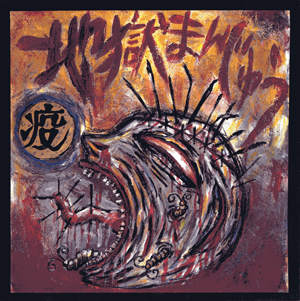Jigoku Manjyu “s/t” 7" flexi

Before I begin, I must note that my neighbor has been playing “That’s Amore” by Dean Martin at maximum volume for two days, which is far more cringeworthy, insaniac, and headache-inducing than any Japanese noise-core. I am glad to drown it out with Jigoku Manjyu. This one-sided flexi came out during the first moments of the “Gloom era” of Japanese noise-core, but it was not of that era. Rather, I believe it was one of the last examples of 80s-style Japanese noise-core. It is sparse, brutally primitive neanderthal noise-core, with rudimentary, roll-filled drumming and mosquito-buzz guitars. Unlike so many bands of recent years, this one did not consciously imitate any other. In fact, Jigoku Manjyu, which my pal Kevin tells me means something like “Hell in a Steamed Bun” (as in Chinese dim sum), may be the most original of the noise-core bands on this list. This flexi takes “I ain’t bin to no music school” to its extreme. These psychos didn’t go to school because they’re obviously feral and were raised by wolves. Clan of the Cave Bear or something. For me, a motivation for throwing back the shroud of “taste” on shit-fi music is demonstrating that music typically considered inept or primitive can actually be quite innovative. But if you’re reading this, you probably already know that. When it comes to high art, gimme Confuse or Jigoku Manjyu over Dean Martin any day.

On the primitive tip, Jigoku Manjyu apparently used a cave painting for the record sleeve. Whatever caveman was responsible, however, seems to have taken just a smidge of influence from Pushead, with those caterpillars crawling out of this poor soul’s skin. Also, I just love the lobotomy scar (or maybe the top of the skull was removed for a complete excision of the brain), which matches the feeling of the music. The only English that appears on the sleeve (which is folded upside-down) are the words “Hard Core” and, um, “Monoral.”
Oddly enough, two of the tracks on the flexi also appeared on a CD-only compilation called “Target Dictator,” released by the Fight Men label in 1991. This compilation features many of the second-string hardcore bands of the era, like Less Haze, Innocents, So What, Disclaim, and others. Jigoku Manjyu, unlike the others, don’t use any English on their page in the CD booklet. In comparison, Jigoku Manjyu sound like their target, dictator or otherwise, was quite different from the other bands’. Beyond the mystery and obscurity of the band, due, of course, to their avoidance of English and their odd artwork and sound, there is something unsettling about what their songs offer. What distinguishes the first era of Japanese noise-core from the next era(s), in my view, is this strangeness. These bands, from Tranquilizer to Z, Gudon to Confuse, come across as having attempted to build a new sound from scratch. Even when they paid obvious homage, it was by superseding the inventiveness of their forebears. Today, despite the rapidity with which we can access such obscurities, these records defy accessibility. Time has not diminished their oddity. Jigoku Manjyu is not feel-good music, and I can think only that with the homogenization of so much music today—even supposedly lo-fi, unpolished, and primitive music—this band’s time is now. If the state of music doesn’t piss us off, we need only look outside our windows for reasons to be angry. These Japanese noise-core bands are the soundtrack to a world growing ever more desperate, and one of its (perhaps minor) desperations involves the absence experiences that are not mediated, controlled, or alienated. The imperative of Japanese noise-core is not to be background music. By demanding our attention with their caustic sound, they engage us, and they demand open-mindedness—not toward the world of empty, mind-numbing commodities, but toward a life of rich, deeply felt sensations. In doing so, they reject the blasé, the mediocre, the false. To instrumentalize this sensitivity—what Susan Sontag might have called “an erotics of music”—would be truly radical. The choice is ours.
The choice is shit-fi.

![]()

![]() Page from "Target Dictator" CD
Page from "Target Dictator" CD
